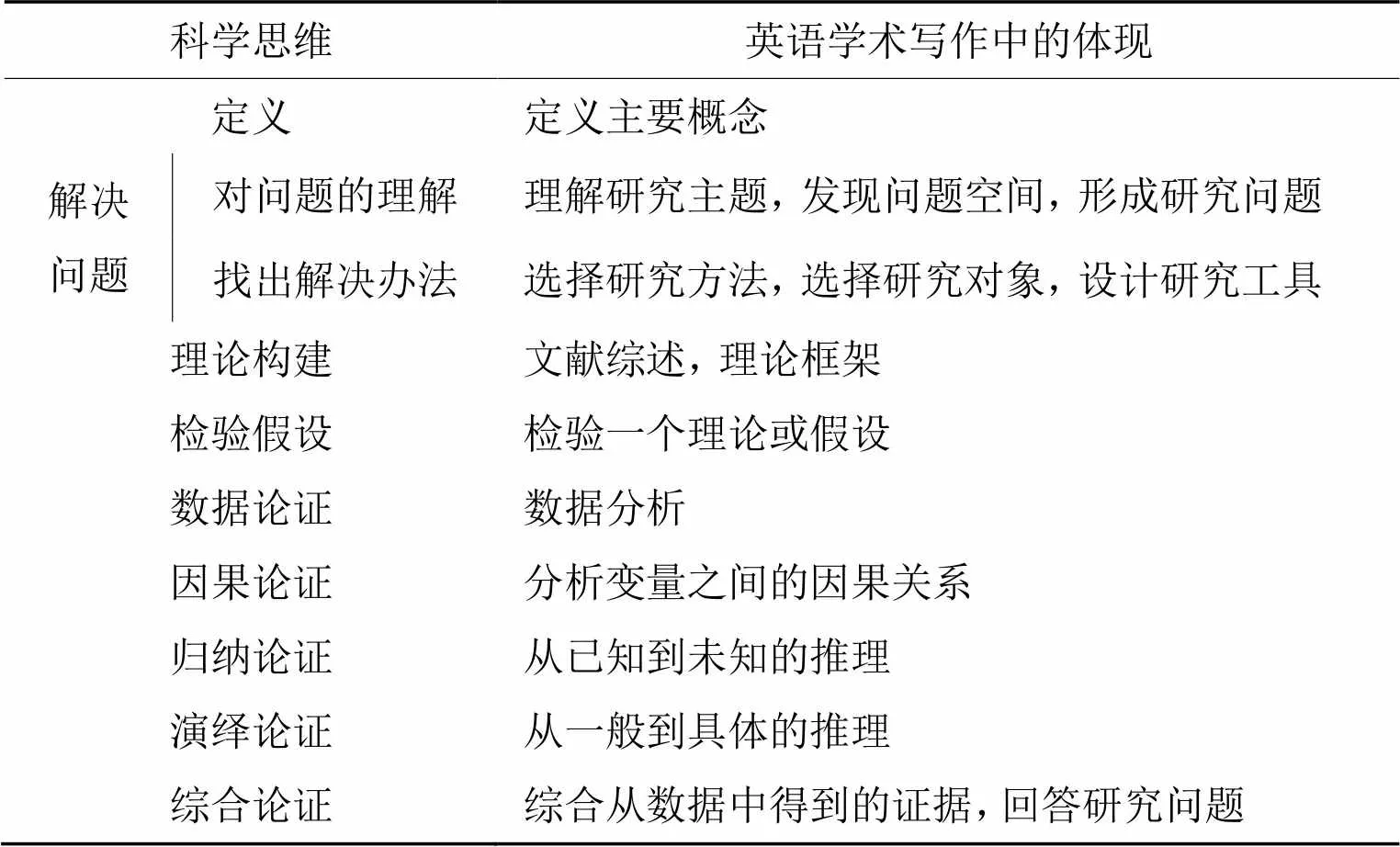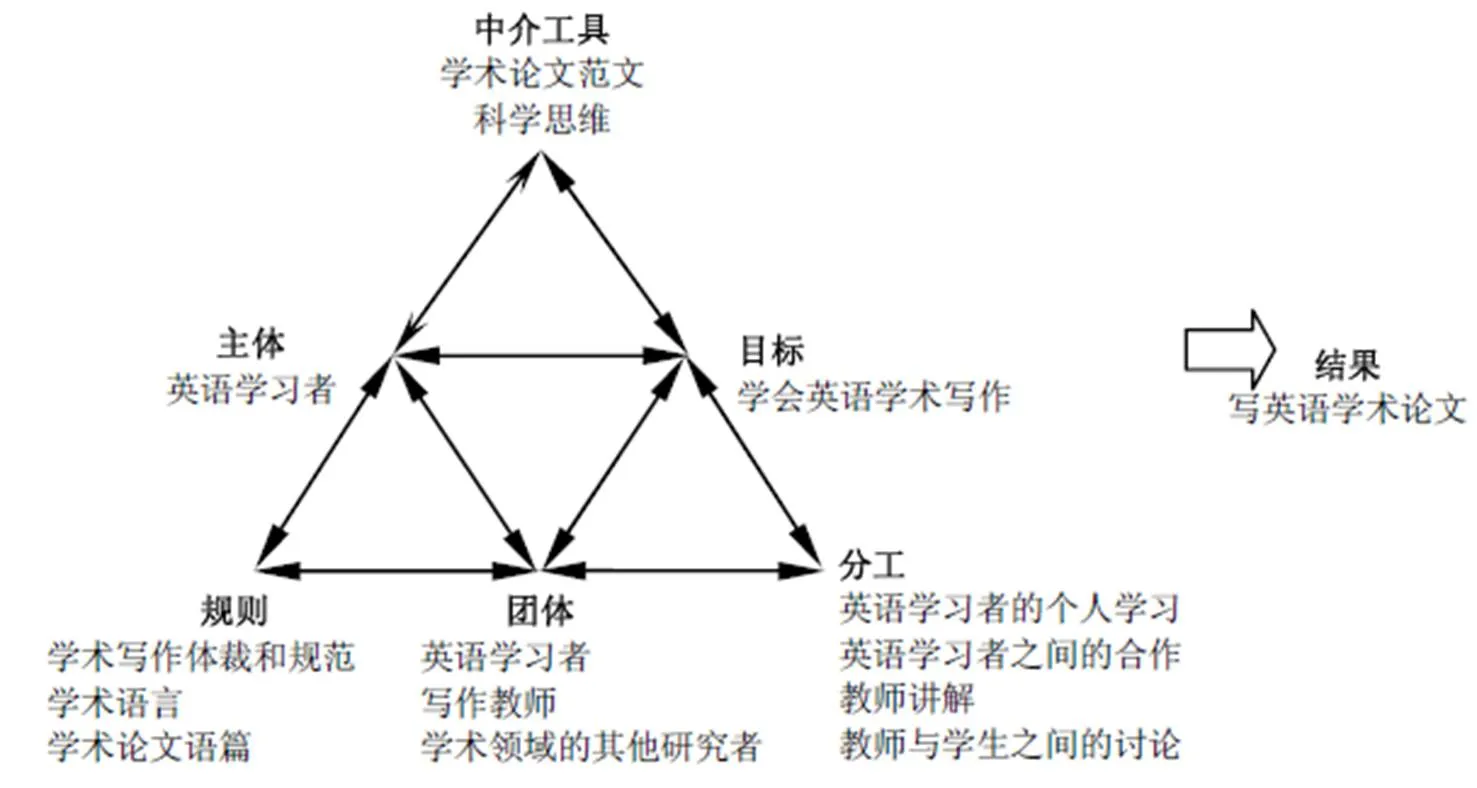英语学术论文写作及构建写作过程模型
熊淑慧
英语学术论文写作及构建写作过程模型
熊淑慧
(上海理工大学外语学院,上海 200093)
英语学术论文写作是英语学习者学习英语的高级阶段,为以后用英语进行学术研究做准备。在以往的写作研究中,英语学术论文写作过多地关注机械的技能和语言特点,写作模型大多是描述非学术论文的写作过程。但英语学术论文写作能力不仅需要语言层面的技能,还应包括以下三部分:学术语言、学术论文的语篇及科学思维。在探讨学术语言、学术论文语篇的特点以及科学思维在学术写作中的体现之基础上,运用活动理论构建出课堂教学环境下英语学术论文写作过程的模型,突出这三者在学术论文写作中的作用。
英语学术论文写作;学术语言;学术论文语篇;科学思维;活动理论
英语学术论文写作是英语学习者学习英语的高级阶段。他们在掌握了日常交际用的英语之后,需要学习英语学术论文写作,为今后用英语进行学术研究做准备。孙文抗以问卷形式调查了147位英语专业毕业生的学士论文写作情况,发现相当数量的调查对象在领会论文要求、查找资料和英语表达方面存在明显的问题,半数以上的人并未从做论文中得到应有的收获。在传统的英语学术论文写作的课堂上,教师偏重于介绍学术写作的规则,但这不足以使学习者掌握英语学术论文写作。
国内关于中国学生的英语学术写作方面的研究多集中在语言特点方面上,如英语学术论文写作中的情态动词和模糊语的用法,模糊语的使用,学术英语语体研究,摘要的语篇和语言特点的研究,引言的文体研究。在国内关于英语学术写作的研究关注的是语言形式,忽略了内容和思想之间的关联。目前的英语写作模型大多是描述非学术论文写作过程,缺乏描述在课堂中学术论文写作过程的模型。
Nunan指出,学术研究是一个系统的探究过程,包括3个方面:(1)一个问题或假设;(2)数据;(3)数据的分析和解释。即研究要用证据、数据来支持观点或者找到解决问题的方法。因此,如何科学地思考并运用合适的语言形式(包括语篇和句子层面)才是学术写作的关键。英语学术论文写作能力由三部分组成:学术语言、学术论文的语篇和科学思维。在活动理论框架下建构出英语学术论文的写作过程模型,用以解释课堂教学环境下如何发展学术写作能力。
一、英语学术论文写作三要素
(一)学术语言与科学思维之间的关系
学术写作的最终目的是说服读者相信其观点的正确性,并接受其观点。说服读者靠的不仅是语言表达,还有语言背后的科学思维,两者密不可分。非专业读者阅读学术文章时觉得阅读的困难在于生词。Myers认为,即使用了专业字典也无济于事,因为造成理解困难的原因是没有掌握学术文章中内容之间的内在联系。
在学术写作中,选择使用词语表达他们的观点及对其观点的确定程度,选择恰当的体裁描述研究方法,证明其合理性。他们思考其他学者的文献,质疑自己及其他人对文献的理解。这种构建、理解、选择及批判文献的活动构成了科学思维活动。
Suppe通过研究1000篇科学文章,总结出这些文章的言语行为:展示数据、找出关联、描述方法、解释数据等。这些言语行为创造出学术论文的论辩性结构,目的是对研究结果提出合理的解释。学术语言结构由元语言术语搭建,如cause,effect,obse- rve,hypothesis,data,results,explanation,prediction;还由论证其研究方法和结论的合理性的论证结构构成。学术语言在宏观层面上是论辩性的,以支持基于证据基础上的结论。在微观层面上,学术语言执行一系列的言语行为,这些言语行为结合在一起就组成了论辩性的结构。只有理解了微观各部分之间的联系,才能在宏观上理解学术语言。
由此可见,学术语言是进行科学思考的载体,科学思考由学术语言通过言语行为和论辩结构来体现。
(二)学术语言的特点
学术语言的特点体现了它在特定的学术语境下完成交际任务的要求,表达的信息内容复杂,涉及的概念抽象,理论性强,所需使用的语言相应地变得更加复杂。从交际的角度来看,学术语言之所以难,除了信息的复杂之外,原因还在于交际情景不明析,读者对象的不确定。
Cummins针对二语学习者,区分了“认知学术语言能力”(Cognitive Academic Language Proficie- ncy)和“基本人际交往能力”(Basic Interpersonal Communicative Skill)这两个概念。Cummins认为,“基本人际交往能力”比较容易且可以自动学会,而“认知学术语言能力”则需更长期的过程。
基于Snow和Uccelli的研究,表1从人际立场、信息量、信息组织、词汇选择以及表达一致性等五方面总结了学术语言的语言特点。
表1学术语言的语言特点

Tab.1 Linguistic features of academic language
学术语言中的人际立场是客观的和权威的。学术语言要求一个非对话体的独立观点的构建,而且是“一个坚定自信的作者作为博学的专家提供客观信息”。学术语篇的信息量具有简明和高密度的特点,简洁明了地传递信息,避免无谓的重复。学术写作注重简洁,以很少的词语概括大量的信息。这种信息密集通常以名词化和扩展的名词短语来实现。学术语言以从句和复杂的句法为特点。在信息组织上,语篇意识通过语篇和元语篇标记实现。学术语言中信息的组织根据逐步的逻辑论证,使用独立的语内照应策略,而非依赖情景语境。在词汇层面上,要求使用特定学科的精准术语。最后一个层面是表达一致性,或者说是语言和它所要表达的事实之间的对应。名词化的形式如evaporation同时具备过程(水蒸发)和物体(名词一般用来指一个物体)的语义特征。在学术语言中有大量的语法隐喻,特别是用名词化表示过程。名词化同时也使得词汇密度增大,名词化代替从句,可以成为长的、压缩信息量的句子。在口语中,有生命的个体在句中是语法意义上的施动者;而学术语言中,抽象概念做施动者。
以上海某高校英语专业本科生大四上学期的课程论文为例,作一分析。例1、例2是学生问卷调查中导语的初稿,例3是学生的修改稿。对比初稿和修改稿,可以看出初稿的口语化倾向,修改稿则体现了学术语言的特点。
例1 Dear friends
I am so sorry for disturbing you but I really need to take a few minutes to finish our questionnaire. Thank you very much.
例2 My dear friend
I am sorry for bring you some trouble. I would be glad if you could help me to finish the question- naire about the issue of family. Thank you so much.
例3 The purpose of this investigation is to find out about personal opinions of the good family in Chinese culture. Please take a few minutes to answer these questions be selecting the most suitable choice or choices according to your situations. We will appre- ciate your time and efforts very much.
Research Team
对比例1、例2和例3,可以看到学术语言的主要特点。例3去掉了介入的话语(I am so sorry for disturbing you; I am sorry for bring you some trouble);去掉了冗长的话(I really need; I would be glad if you could help me);从个人化话语转变为非个人化话语(Thank you so much改为We will appreciate your time and efforts very much);以及权威的立场(The purpose of this investigation is…)。
例4和例5是学生写的选择问卷调查为研究方法的理据,例4是初稿,例5是修改稿。
例4 Rationale: The result of a questionnaire in the form of multiple-choice is quite objective. From the questionnaire, it is convenient for us work out the percentages scientifically.The more respondents take the questionnaire, the more accurate numbers will come out. Thus from the numbers, we can directly and clearly analyze the results. What’s more, in the questionnaire, we can also ask the respondents’ opi- nions. It’s quite easy to collect their ideas.
例5 Rationale: The method we employed was a survey through a questionnaire which was designed based on the group members’ brainstorming after studying the information provided in the textbook. The questionnaire…contained six sources of respect as well as their influence on teachers’ job satisfaction.
The questionnaires were distributed by email to five male teachers and five female teachers…Hence, 100% questionnaires were returned. In the question- naire, the teachers were required to provide answers to the questions in a multiple choice form. The ques- tions included their idea towards the relationship between respect and job satisfaction, whether they received respect in their current career and how they influenced their job satisfaction.
例4中出现了在学术论文语境下不恰当的口语化特点,如松散的对话式结构(The result of a questionnaire in the form of multiple-choice is quite objective...The more respondents take the question- naire, the more accurate numbers will come out. Thus from the numbers, we can directly and clearly analyze the results.);简单语法(It’s quite easy to collect their ideas)。例5则体现了学术语言的特点:客观权威的立场、词汇密度大、词汇丰富、正式的表达、复杂的语法,(The questions included their idea towards the relationship between respect and job satisfaction, whether they received respect in their current career and how they influenced their job satisfaction.);抽象的个体做主语(academic research also have a great influence on teachers’ future deve- lopment),使用多样的连词(However; In addition to; Hence)等。
(三)学术论文语篇的特点
学术论文有个被称为IMRAD(introduction,method,results,and discussion)常用的语篇结构,帮助写作者用逻辑严密的形式写学术论文。Swales和Feak把语篇结构中组成部分称为“语步(moves)”。在Hartley的分类基础上,表2列出学术论文语篇的语步。
(四)科学思维在学术论文写作中的体现
在学术英语写作中,学术语言表达的是科学思维能力的体现,科学思维通过学术语言来展现。科学思维指的是在科学研究中用到的对科学内容的论证过程。科学思维包括了很多认知活动,例如归纳、演绎、类比、因果论证等。在人文科学研究(因本文主要探讨的是英语专业本科生的学术论文写作,他们常涉及的领域是人文社科研究)中,常用到的科学思维有:定义、解决问题、理论构建、检验假设、数据论证、因果论证、归纳论证、演绎论证和综合论证。表3列出了科学思维在英语学术写作中的体现,并以学生习作为例说明。
表2 学术论文语篇结构的语步

Tab.2 Moves in IMRAD
表3 科学思维在英语学术论文写作中的体现

Tab.3 The representations of scientific reasoning in research article writing
定义在研究论文中起着重要的作用。科学研究的目的之一就是发展新的知识,这也需要创造新概念,创造新词或赋予旧词新的意义。定义之所以重要是因为它们定义了研究范围,在此范围内的研究才有意义。
例6 Teachers’ job satisfaction, which describes how content teachers are with their job on both material and spiritual aspects, is of cardinal impor- tance to their teaching quality and productivity, and consequently exerts a great impact on students’ self-esteem (Peck, 1977).
科学思维可以理解成为解决问题的一种形式。一个问题空间包括一个问题的所有可能的情况和可能的解决方法。科学思维是在不同问题空间中的研究。解决问题包括两方面:1.对问题的理解,即对问题本质的理解;2.找出解决办法。在英语学术写作中,解决问题指的是面对一个学术写作任务时,理解研究主题,发现问题空间,形成研究问题,选择研究方法、研究对象,确定研究工具。
方面1 对问题的理解(理解研究主题,发现问题空间,形成研究问题)
例7 On the basis of these two theories, we find that many university teachers are working unhappily with great pressure, which not only does harm to teachers themselves, but also brings negative effects on their students. If this situation remains unchanged, the educational system would be confronted with stern challenges. This research is devoted to finding out about the opinions of teachers on the relationship between job satisfaction and working pressure.
方面2 找出解决办法(选择研究方法,选择研究对象,设计研究工具)
例8 A questionnaire was designed for teachers who were requested to provide quantitative infor- mation. This information was used in our correlation analysis in the relation between teachers’ job satisfa- ction and their working pressure. The questionnaire was distributed to 10 teachers.
理论构建在学术论文写作中体现为文献综述和构建理论框架。
例9 According to Xie, one’s job satisfaction is related to his working pressure (Xie, 2000). Generally speaking, a worker with high working pressure will not be satisfied with his job and vice versa. Also, a work with less working pressure will have higher job satisfaction. On the basis of Xie’s theory, we conduct this research trying to examine and certify the corre- lation between the working pressure and the job satisfaction of teachers.
检验假设是科学思维的重要特点,是收集证据评估一个命题是否真实的过程。在英语学术写作中,检验假设指的是学习者对于一个理论或者观点的检验。
例10 Regarding those two phenomena, we start to conduct the survey to see whether there are problems in the curriculum structure for students.
为了呈现令人信服的结论,研究者用数据分析来体现数据的客观性。
例11 From the table, we can see the result as follows: 12 respondents chose the teacher’s role as instructor; 10 chose the role as guider; 8 chose the role as controller; 7 regarded the teacher's role as helper and authority; 5 regarded the role as facilitator and only 1 thought the teacher’s role was playmate.
因果论证是指找出各变量间的因果关系,找出因果模式。在学术英语写作中表现为分析变量之间的因果关系。
例12 Here we notice that in universities, alt- hough sometimes teachers do not know their students’ real opinions and attitudes towards them, they still feel respected. Our group attributes the phenomena to the reason that teaching) is a job widely respected by almost all the citizens in the society, and thus their self-respects do not necessarily come from their students.
科学的基本特点是科学家们假设存在可遵循的规律,并从这些规律推导出新的科学发现。两种常用的论证策略是归纳论证和演绎论证。归纳论证是从已知到未知的推理(如例13),演绎论证是从一般到具体的推理(如例14)。
例13 Emphatically, the EPS courses are con- sidered helpless to their future career. About 60% consider helpless, 33% hard to say, and only 7% generally helpful. Obviously, it proves that it is a waste of time for undergraduates to take the current EPS courses.
例14 According to several studies, the increase of income can stimulate people’ enthusiasm for work, and teachers are not excluded. At present, many university professors go out of campus to seek opportunities of part-time jobs, and torturing is prevalent among middle schools teachers…Nowadays, the voice of complaining about low income, parti- cularly that among university teachers is louder… People may wonder that if teachers are so dissatisfied with their jobs why they do not just quit. The reason is that there are also other important factors that can lead to teachers’ job satisfaction. …teachers gain more spiritual satisfaction than many other workers do. Their success can not only be measured by income but also by self-respect and students’ achievement.
综合论证指的是结合研究问题、假设以及研究发现进行总体讨论的过程。在英语学术写作中,综合论证能力是学习者讨论研究结果的能力,从得到的数据综合讨论以回答研究问题。
例15 This study shows that teachers in the English Department hold quite similar views towards the sources of job satisfaction. From their perspec- tive, job satisfaction in most cases derives from the realization of spiritual ambitions rather than the fulfillment of material ambitions.
二、活动理论框架下构建英语学术论文写作模型
现有的写作模型描述母语或二语在非学术情景下的写作。Paltridge等第一次提出了学术写作的模型,考虑到学术写作的外部环境因素,强调了培养作者的语言特点、文本特点以及自我调控能力。但这些模型都未能解释学习者在课堂教学的环境下如何体现学术论文写作的三要素。
现在用活动理论来解释学术写作。活动理论是Engeström在Vygotsky的主体、客体和中介工具三角模型基础上发展而来。活动理论中,活动是目标的一个形式,是把目标转化为结果而发生的。主体和目标之间的关系以工具为中介,工具可以是物质的也可以是思维的。为了处理个体和个体在不同环境中他们之间的关系,Engeström引进了一个重要的成分——团体。规则指的是团体中明确的或隐形的规范、惯例及社会关系。分工指的是在把目标转化成结果的过程中团体的组织结构。活动理论模型的建立可把外部环境与人类行为结合起来考察。图1描述了在活动理论框架下构建学术英语写作的活动模型。

图1 英语学术写作的活动模型
英语学术写作是英语学习者在学术写作范文和科学思维的中介下进行英语写作的,为了得到写作英语学术论文的结果,需要遵循学术写作体裁和规范。在英语学习者、写作教师及学术领域的其他学者组成的团体中,共同参与分工,这样,英语学习者的读者对象是写作教师和学术领域的其他学者。写作教师的角色也变成了非个人的关系,是一个具有相关学术知识的学术团体成员的角色。学习者通过以下三者的中介调节作用来提高学术论文写作能力:1.学术论文范文,科学思维;2.学术论文写作体裁和规范,学术语言,学术论文语篇;3.老师讲解,学习者之间以及和老师的互动。
三、对英语学术论文写作教学的启示
从活动理论的框架下构建学术论文写作的新模型中,可看到学术论文写作的三要素,即:学术语言、学术论文的语篇以及科学思维。这三者在学术论文写作过程中起着重要的作用。科学思维是中介工具,学术语言和学术论文的语篇是规则。学习者通过科学思维的中介作用,依照学术语言和学术论文语篇的规则,达到学会写作学术论文的目的。学生学术论文习作中常出现语言和思维两个问题交织在一起的情况,作为写作教师,应当给出语言、篇章结构以及科学思维三方面的建议的反馈。当学生知道如何论证,该写什么,选择怎样的语言形式后,学术论文写作能力才能得到提高。
[1] 孙文抗. 英语专业学士论文写作现状分析[J]. 外语界, 2004, (3): 59-64.
[2] 杨玉晨. 情态动词、模糊语言与英语学术论文写作风格[J]. 外语与外语教学, 1998, (7): 24-35.
[3] 冯茵, 周榕. 学术论文摘要中模糊限制语的调查与分析——基于英语专业毕业论文与国外期刊论文的对比研究[J]. 外国语言文学, 2007, (2): 108-112.
[4] 雷秀云, 杨惠中. 基于语料库的研究方法及MD/MF模型与学术英语的语体研究[J]. 当代语言学, 2001, (2): 145-151.
[5] 葛冬梅, 杨瑞英. 学术论文摘要的体裁分析[J]. 现代外语, 2005, 28(2): 138-146.
[6] 徐有志, 郭丽辉, 徐涛. 学术论文体裁教学不可或 缺——英语专业硕士学位论文引言写作情况调查[J]. 中国外语, 2007, 4(4): 47-51.
[7] 熊丽君, 殷猛. 论非英语专业学术英语写作课堂的构建——基于中美学术英语写作的研究[J]. 外语教学, 2009, (2): 50-56.
[8] Nunan D. Research Methods in Language Learning[M]. Cambridge: Cambridge University Press, 1992.
[9] Myers G. Lexical cohesion and specialized knowledge in science and popular science texts[J]. Discourse Pro- cesses, 1991, 14(1): 1-26.
[10] Suppe F. The structure of a scientific paper[J]. Philo- sophy of Science, 1998, 65(3): 381-405.
[11] Cummins J. The cross-lingual dimensions of language proficiency: Implications for bilingual education and the optimal age issue[J]. TESOL Quarterly, 1980, 14(2): 175-187.
[12] Cummins J. Age on arrival and immigrant second-language learning in Canada: A reassessment[J]. Applied Linguistics, 1981, 11(2): 132-149.
[13] Snow C E, Uccelli P. The challenge of academic writing [C]//D R Olson, N Torrance. The Cambridge Handbook of Literacy. New York: Cambridge University Press, 2009: 112-133.
[14] Schleppegrell M J. Linguistic features of the language of schooling[J]. Linguistics and Education, 2001, 14(4): 431-459.
[15] Swales J M, Feak C B. Academic Writing for Graduate Students[M]. (2nd edn). Ann Arbor, MI: University of Michigan Press, 2004.
[16] Hartley J. Academic Writing and Publishing: A Prac- tical Handbook[M]. New York: Routledge, 2008.
[17] Holyoak K J, Morrison R G. (Eds.) The Cambridge Handbook of Thinking and Reasoning[M]. Cambridge: Cambridge University Press, 2005.
[18] Hayes J R, Flower L. Identifying the organization of writing processes[C]//L Gregg, E R Steinberg. Cognitive Processes in Writing. Hillsdale, NJ: Lawrence Erlbaum, 1980: 3-30.
[19] Bereiter C, Scardamalia M. The Psychology of Written Composition[M]. Hillsdale, NJ: Lawrence Erlbaum As- sociates, 1987.
[20] Grabe W, Kaplan B K. Theory and Practice of Writing: An Applied Linguistic Perspective[M]. New York: Longman, 1996.
[21] Hayes J R. A new framework for understanding cogni- tion and affect in writing[C]//C M Levy, S. Ransdell. The Science of Writing: Theories, Methods, Individual Differences and Applications. Mahwah, NJ: Lawrence Erlbaum, 1996: 29-55.
[22] Paltridge B, Harbon L, Hirsch D, et al. Teaching Aca- demic Writing: An Introduction for Teachers of Second Language Writers[M]. Ann Arbor: The University of Michigan Press, 2009.
[23] Engeström Y. Learning by Expanding: An Activity Theoretical Approach to Developmental Research[M]. Helsinki: Orienta-Konsultit, 1987.
[24] Vygotsky L. Mind in Society: The Development of Higher Psychological Processes[M]. Cambridge, MA: Harvard University Press, 1978.
[25] Vygotsky L. Thought and Language[M]. Cambridge, MA: MIT Press, 1986.
English Research Article Writing Competence and a Tentative Model of English Research Article Writing Process
Xiong Shuhui
(,,,)
English research article (RA) writing is the highest stage for Chinese college-level learners of English as a foreign language (EFL) in classroom settings. After mastering English for daily communication, EFL learners need to learn English RA writing preparing for their future academic study in English. In previous research, English RA writing has been much focused on mechanical skills (such as referencing techniques) and linguistic features. Previous writing models are intended to describe the writing process of general writing tasks, rather than RA writing. This paper argues that English academic writing should include three major components: academic language, discourse structure of RA, scientific thinking and reasoning. This study discusses features of academic language, characteristics of the discourse structure of research paper, and the representations of scientific reasoning in RA writing. A tentative model of RA writing process is proposed under the framework of activity theory.
;;;;
H315
A
1009-895X(2011)02-0126-07
2011-01-15
熊淑慧(1979-),女,讲师。研究方向:二语习得。E-mail: xionglisa@163.com

